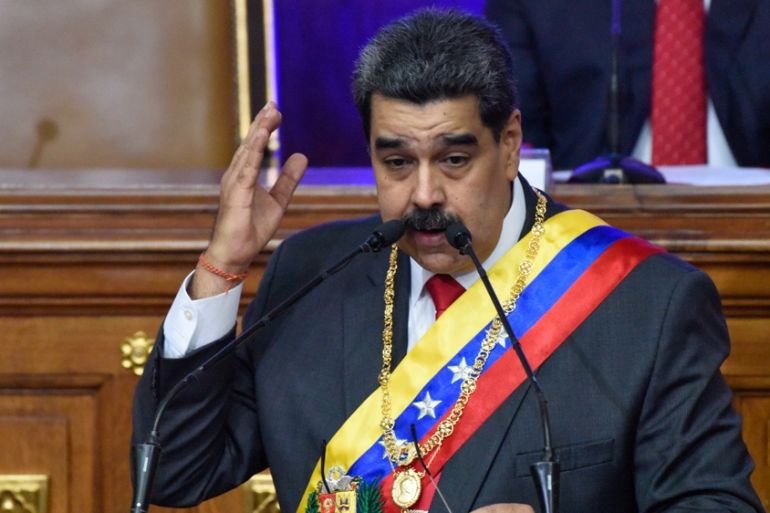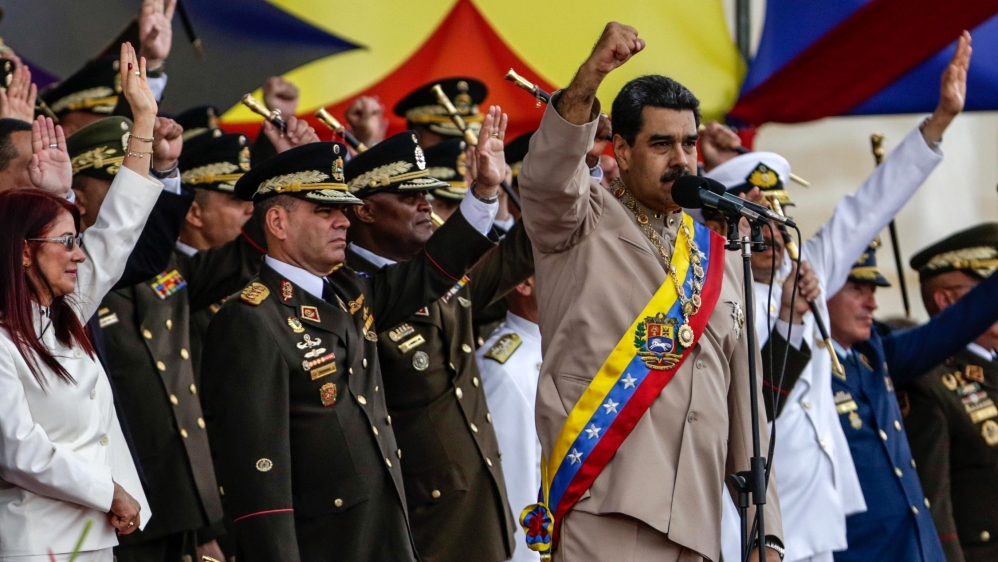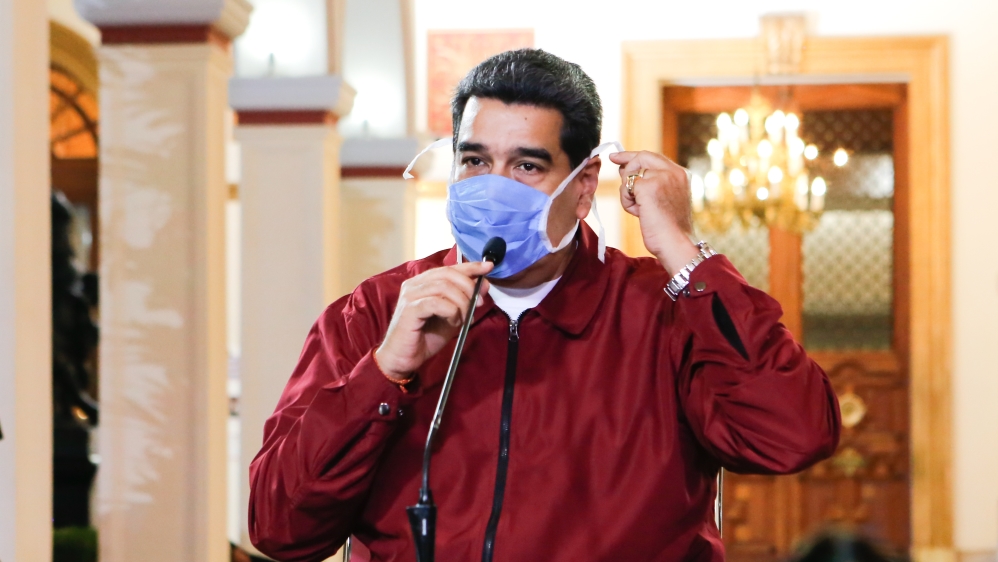US indicts Venezuela’s Maduro on narco-terrorism charges
In rare action, US offers up to $15m reward for information leading to the arrest of Nicolas Maduro.

The United States Department of Justice has announced that it has indicted Venezuela’s socialist leader Nicolas Maduro and several key aides on charges of narco-terrorism.
The department accused them on Thursday of conspiring with Colombian rebels “to flood the United States with cocaine”.
Keep reading
list of 3 itemsTimeline: How the new coronavirus spread
Fear as Colombia closes border with Venezuela over coronavirus
“We estimate that somewhere between 200 and 250 metric tonnes of cocaine are shipped out of Venezuela by these routes. Those 250 metric tonnes equates to 30 million lethal doses,” it said.
As the indictments were unsealed, Secretary of State Mike Pompeo announced that the State Department would offer cash rewards of up to $55m for information leading to the arrests or convictions of Maduro and four of his associates. The rewards, up to $15m for Maduro and up to $10m each for the others, are being offered under the department’s Narcotics Rewards Program, which has paid more than $130m in awards for information regarding some 75 drug traffickers since it was created in 1986.
“While holding key positions in the Maduro regime, these individuals violated the public trust by facilitating shipments of narcotics from Venezuela, including control over planes that leave from a Venezuelan airbase, as well as control of drug routes through the ports in Venezuela,” Pompeo said in a statement.
Escalating tensions
The indictment of a functioning head of state is highly unusual and is bound to ratchet up tensions between Washington and Caracas as the spread of the coronavirus threatens to collapse a health system and oil-dependent economy driven deep into the ground by years of corruption and US sanctions.
Venezuelan Foreign Minister Jorge Arreaza said the charges and rewards being offered showed the Trump administration’s “desperation” as well as its “obsession” with the South American country.
Analysts said the action could boost Trump’s re-election chances in the key swing state of Florida, which he won by a narrow margin in 2016 and where Venezuelans, Cubans and Nicaraguans fleeing authoritarian regimes have political muscle.
But it is unclear how it brings Venezuela any closer to ending a 15-month standoff between Maduro, who has the support of Russia and China, and the US-backed opposition leader Juan Guaido, who invoked the constitution last year to declare himself interim president of the country. It could also fragment the US-led coalition against Maduro if European and Latin American allies think the Trump administration is overreaching.
“This kind of action does nothing to help a negotiated solution – something that’s already really difficult,” said Roberta Jacobson, who served as the State Department’s top diplomat for Latin America until 2018.

Maduro, a 57-year-old former bus driver, portrays himself as an everyman icon of the Latin American left. He has long accused the US “empire” of looking for any excuse to take control of the world’s largest oil reserves, likening its plotting to the 1989 invasion of Panama and the removal of General Manuel Noriega to face drug trafficking charges in Florida.
Attorney General William Barr and Elliott Abrams, the State Department’s special envoy on Venezuela, are driving the hawkish US stance towards Maduro much as they pushed for Panamanian military ruler Manuel Noriega’s overthrow in the late 1980s – Barr as a senior Justice Department official and Abrams as assistant secretary of state for Latin America at the time.
US officials see other parallels as well. Noriega transformed Panama into a playground for violent, international drug cartels while the Trump administration has accused Maduro and his military henchmen of harbouring drug traffickers, rebel fighters from Colombia and even Hezbollah.
They have also accused government officials together with well-connected businessmen of stealing hundreds of billions of dollars from the state coffers, much of it from state oil giant PDVSA, which has seen its production plunge to a 70-year low.
No easy task
Still, charging Maduro was no easy task. Sitting foreign leaders normally enjoy immunity from prosecution under US law and international norms.
But the US is among 60 countries that no longer consider Maduro a head of state. They instead recognise Guaido, the head of congress, as Venezuela’s rightful leader following the socialist’s re-election in a 2018 race marred by allegations of fraud and an opposition boycott.
The evidence against Maduro was collected over several years by investigators in Miami, New York, Houston and Washington, DC who have brought drug trafficking, foreign bribery and money-laundering charges against several senior Venezuelan officials, members of the military and government-connected businessmen.
Much of those investigations have focused on PDVSA, which is the source of practically all of Venezuela’s export revenue. The US last year sanctioned PDVSA, barring Americans from doing business with the oil giant.
But to the surprise of many, Hugo Chavez’s hand-picked heir has stubbornly clung to power, withstanding months of street protests last year and even an attempted US-backed military revolt all the while millions of Venezuelan migrants flee hyperinflation and widespread food shortages.

With support on the streets for Guaido fading, the Trump administration raised the ante last year, withdrawing support for a Norway-sponsored mediation effort and extending sanctions so that even foreign companies faced retaliation for extending Maduro a lifeline.
Separately, Barr, echoing calls from Florida Republican Senator Marco Rubio, prioritised investigations into Maduro’s inner circle, according to two people who spoke on condition of anonymity to discuss internal Justice Department deliberations.
The pressure to deliver, the people said, went into overdrive around the time when Guaido visited Washington, DC, in February and Trump praised him as his guest at the State of the Union address as “a very brave man, who carries with him the hopes, dreams and aspirations of all Venezuelans”.
But the spread of the coronavirus pandemic delayed the announcement, which was originally scheduled for March 16, according to the individuals.
The virus is likely to further distract Washington’s attention and threatens to splinter the opposition, some of whom have expressed a willingness to work with Maduro to stem the burgeoning medial crisis. It could also give new life to Maduro’s call for the US to ease sanctions, an idea that several European Union allies have also warmed to.